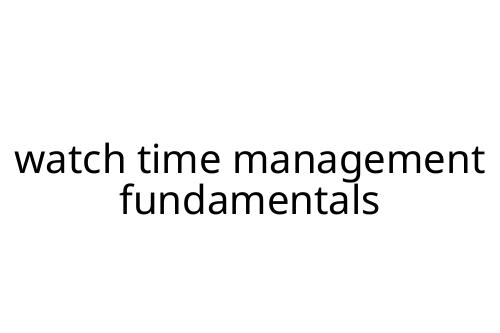watch time management fundamentals
Learning to watch time management fundamentals is a straightforward way to improve productivity, reduce stress, and create better work-life balance. Whether you’re juggling work projects, studying, or simply want more control over your day, getting the basics right matters.
Why Time Management Fundamentals Matter
Time is the one resource you can’t replace. When you understand the fundamentals of time management, you gain the tools to prioritize, set boundaries, and accomplish what’s important—without burning out. Effective time management is not about squeezing every minute; it’s about managing your attention, energy, and tasks.
Core Time Management Skills
Prioritization
Fundamental to any time management approach is the skill of prioritizing. Not every task holds equal weight. Learning to identify “must-dos” versus “nice-to-dos” is essential. Techniques like the Eisenhower Matrix or ABC prioritization can clarify what’s urgent, important, or simply distracting.
Planning
A basic yet crucial skill is planning. This applies to your day, week, and even month. Simple tools work well: physical agendas, digital calendars, or even a well-organized to-do list. Planning helps prevent the last-minute rush and reduces the risk of forgetting critical tasks.
Setting Boundaries
Managing your time well often means learning to say no. It’s easy to overload your schedule, but doing so erodes both productivity and motivation. Boundaries help you maintain focus on key priorities and provide needed downtime.
Common Challenges
Even with a grasp of key principles, real-world demands can make solid time management tough. Interruptions, lack of clarity, or unrealistic expectations are common hurdles. Building in buffer time for unexpected events can help, as can regular reviews of your schedule.
Pros and Cons
Mastering time management offers clear benefits: less stress, greater productivity, and more free time. But there are limits. Over-planning can become rigid or demotivating. The key is discipline balanced with flexibility—adapt your methods as your needs or workload shift.
Practical Tips
If you’re ready to watch time management fundamentals in action, start small. Track your time for a few days to spot where it goes. Block off periods for focused work, but don’t overlook scheduling breaks. Use reminders or alarms to keep on top of tasks. Review your priorities weekly and adjust as needed.
Final Thoughts
Getting good at time management isn’t about perfection. It’s about being intentional with your hours and minutes. By focusing on strong fundamentals—like prioritizing, planning, and setting boundaries—you put yourself in a position to work smarter, not harder. Start with basics and build from there. Over time, you’ll find the balance that fits your style and goals.

 Keith Tipton played a crucial role in shaping Funds Fortune Roll into a go-to platform for financial insights. With his extensive background in market analysis, Keith contributed by developing tools and resources that empower users to understand economic trends and make informed investment decisions. His attention to detail and commitment to clarity ensure that complex financial topics are accessible to everyone, making him an integral part of the team.
Keith Tipton played a crucial role in shaping Funds Fortune Roll into a go-to platform for financial insights. With his extensive background in market analysis, Keith contributed by developing tools and resources that empower users to understand economic trends and make informed investment decisions. His attention to detail and commitment to clarity ensure that complex financial topics are accessible to everyone, making him an integral part of the team.